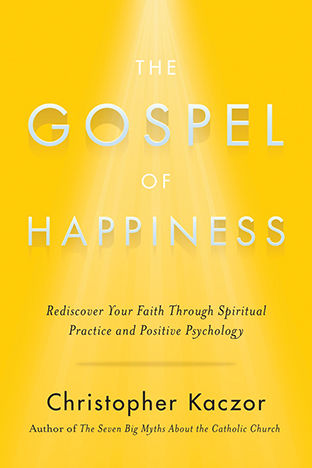Excerpted from “The Gospel of Happiness,” by Christopher Kaczor Copyright ¬© 2015 by Christopher Kaczor. Excerpted by permission of Image Books, a division of Penguin Random House. All rights reserved. No part of this excerpt may be reproduced or reprinted without permission in writing from the publisher.
What is real happiness? How can I experience it? How can I live it? Every thoughtful person asks such questions. Thoughtful Christians add a few more questions, such as: How can I enhance Christian living? Is there any proof that Christian practices enhance happiness? Does Christianity provide happiness in a way that other paths, like psychology, cannot?
These questions are worth exploring, but I never expected to write a book like “The Gospel of Happiness” looking at happiness from a theological and psychological perspective. My only personal experience in psychological counseling had not been positive.
As a graduate student studying philosophy and theology at the University of Notre Dame, I was under tremendous academic and financial pressure. I wanted to be a philosophy professor, but I wasn’t sure if I had what it took to make it. My wife and I were struggling to support our young family of three children on my graduate stipend of $10,000 a year.
Financial pressure, family struggles, and the intensity of my academic work took a toll. A friend suggested I seek psychological counseling, so I did. After the second session, the psychologist said to me, “You know, Chris, there are two kinds of people for whom psychological counseling is completely worthless. One group is hard-core drug addicts. The other group is philosophers.”
Needless to say, there was no third session. So, although my initial experience with a psychologist had not proved helpful, in reading about the philosophy and theology of happiness, my scholarly work on the subject of happiness eventually led me to something called “positive psychology,” which opened my eyes anew.
What I learned from positive psychology was astonishing. First, although some people believe that faith and psychology contradict each other, researchers in positive psychology found that traditional Christian practices such as giving thanks, forgiving others and serving your neighbor promoted human happiness and well-being.
I learned that I did not need to choose between Christian faith and positive psychology any more than I had to choose between Christian faith and modern medicine. Christian believers can embrace the findings of positive psychology, even if its source is secular science.
As St. Augustine wrote in “On Christian Doctrine,” “Let every good and true Christian understand that wherever truth may be found, it belongs to his Master.” St. Thomas Aquinas had the same insight: “Every truth, no matter who utters it, comes from the Holy Spirit.”
Indeed, positive psychology vindicates the wisdom of Christian practices. Some philosophers, like Friedrich Nietzsche, claim that Christian practices undermine a flourishing human life. But positive psychology provides empirical evidence that Christian practices, such as forgiveness, service, and love of neighbor, enhance human well-being.
Second, I discovered that certain contemporary findings in psychology can help Christians to better live the message of Jesus. The Second Vatican Council envisioned such uses of science: “In pastoral care, sufficient use must be made, not only of theological principles, but also of the findings of the secular sciences, especially of psychology and sociology, so that the faithful may be brought to a more adequate and mature life of faith” (Gaudium et Spes, ¬ß62).
In this book, I hope to put into practice this teaching of the Second Vatican Council by showing how positive psychology can enhance Christian living.
I had always thought that psychology was an alternative to religion. In college, I had read Sigmund Freud’s attack on Christian belief. Freud, the founder of 20th century psychology, taught that religion was an illusion, and he wrote that he hoped “that in the future science will go beyond religion, and reason will replace faith in God.”
After I’d read Freud’s view of religion, the idea that psychology and faith are diametrically opposed became cemented in the back of my mind. But Freud’s views — about both religion and psychology — have been challenged in a variety of ways, in part by findings based on empirical evidence.
Contemporary psychology does make use of some Freudian insights, but psychologists do not need to adopt his atheism and hostility to religion. Practicing positive psychology certainly does not necessitate atheism. Indeed, I found that positive psychology is connected in surprising ways with the practice of faith.
It might seem as if seeking after flourishing and happiness runs counter to the Christian message: To be a Christian is about doing one’s duty, not seeking happiness. Being a practicing Christian is about loving your neighbor altruistically and serving God sacrificially; it’s not about getting personal satisfaction.
Certainly, the Christian life involves loving neighbor and loving God rather than selfishly seeking personal satisfaction at other people’s expense. But part of the Christian message is that authentic happiness is to be found not in selfishness, but in self-giving. The Gospel message is not an alternative to but a way to freedom, meaning and happiness.
As Pope Francis notes, “The joy of the Gospel fills the hearts and lives of all who encounter Jesus. Those who accept his offer of salvation are set free from sin, sorrow, inner emptiness and loneliness. With Christ, joy is constantly born anew.”
The Christian way in its fullness, even in its sacrifices for love, is a path to happiness, fulfillment and joy, not an alternative to happiness, fulfillment and joy.

